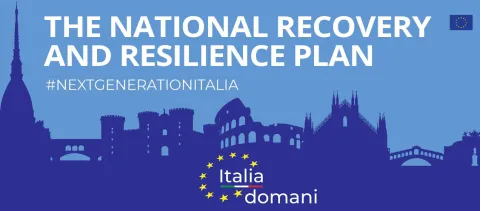
On 22 June 2021, the European Commission concluded the assessment procedure of the Italian National Recovery and Resilience Plan with a positive outcome.
The Commission recommended to the Council the approval of the entire amount requested by Italy, equal to 191.5 billion euros. The Italian Plan, organized into its 16 components and structured into six areas of intervention (“Missions”), was deemed to be fully compliant with the regulatory requirements and entirely centred on the three horizontal dimensions considered priorities (digitalization and innovation, ecological transition and social inclusion).
The measures defined were considered consistent with the challenges and priorities identified and able to improve productivity, competitiveness, sustainability and resilience of the Italian economy: creating new jobs, supporting economic growth and reducing, at the same time, territorial, social, generational and gender gaps.
On 12 July 2021, there was final approval from the EU, and on 13 August, Italy received the first 12 % of the total sum requested for its National Recovery and Resilience Plan.
Such Plan, also called “Italia Domani”, highlights as the pandemic hit the Italian economy harder than other European countries with a gross domestic product shrank by 8.9 %, compared with a European average of 6.2 % and the country with the most significant loss of life in EU.
The Plan displays as Italy is the EU Country with the highest rate of 15-29 years old not in education, employment, or training (NEET) and a women participation rate in employment of only 53.8 % (average of 67.3 % in EU). All this, with an even more significant impact in the South.
The Plan is divided into several missions: 1) digitalization, innovation, competitiveness, culture and tourism, 2) green revolution and ecological transition, 3) infrastructure for sustainable mobility, 4) education and research, 5) inclusion and cohesion, and 6) health.
The National Recovery and Resilience Plan includes an ambitious reform project.
The aim is to focus on reforming public administration, justice, simplifying legislation, and promoting competition.
Regarding the chapter on simplification and competition, the Plan displays as the excess of laws and their lack of clarity hinder the lives of citizens and slow down economic initiatives.
Thus, simplification is an essential reform intervention to promote the country’s growth and support the Plan’s missions.
The document represents as Italy has experimented with regulatory simplification policies in the last years. However, those have had only partial effects in removing constraints and burdens because of 1) the progressive lack of financial, human and instrumental resources that weakened the administrative capacity of the PA and 2) the adoption of legislative simplification measures not accompanied by the necessary organizational interventions.
These aspects will change thanks to the Plan’s resources that make it possible to strengthen the infrastructures and recruit the necessary professionalism.
To improve the effectiveness and quality of regulation, it is displayed as priority will be given to measures relating to:
- the planning of government regulatory initiatives, to allow for adequate preparation of interventions, also through recourse to consultation;
- the analysis and verification of the impact of regulation, with particular reference to the effectiveness of regulatory initiatives and the effects on recipients, including through the use of innovative technologies and artificial intelligence;
- ensure greater clarity, comprehensibility and accessibility of regulation;
- reduce gold plating;
- monitor and evaluate regulatory experimentation initiatives, including the use of unique and temporary regulatory regimes aimed at facilitating the experimentation of innovative products and services hampered by ordinary regulation (so-called “regulatory sandbox”), as well as the application of the “digital by default” principle in regulatory proposals;
- apply, experimentally and progressively, the results coming from cognitive science and behavioral economics applied to regulation;
- constantly monitoring the processes of adoption by the Government of measures implementing regulatory provisions and experimentation with new indicators for evaluating government action/programme, including through implementation of the Monitor platform and the related web application of the Presidency of the Council of Ministers.
Moreover, the Plan also includes the simplification of public contracts. Indeed, it is expressed as simplifying rules on public contracts and concessions is an essential objective for the efficient implementation of infrastructures and the relaunch of construction activity.
In particular, it is highlighted as such simplification must concern the awarding phase and the planning and design phases.
All this has to be done with particular regard to:
- anti-mafia checks and legality protocols;
- fast-track services conference;
- limitation of liability for fiscal damage to cases in which the production of the damage is maliciously intended by the person who acted, with the exclusion of damages caused by omission or inertia;
- institution of the technical advisory board, which has functions of assistance and settlement of disputes with the aim of rapidly settling disputes out of court and reducing the number of disputes litigation before the judge;
- identification of a maximum time limit for the awarding of contracts, with a reduction in the time taken between the publication of the call for bids and awarding of the contract;
- identification of measures to contain the time needed to execute the contract, concerning the types of contract types of contracts;
- reduction in the number and qualification of contracting authorities;
- strengthening of the database of all contracts held by the National Anti-Corruption Authority;
- simplification and digitization of purchasing centre procedures and interoperability of related data;
- reduction and rationalization of regulations on public contracts and concessions
- provision of technical specifications relating to the tenders to be carried out, especially about goods, IT tools and technological components, which guarantee equal access to operators and not operators and do not constitute an obstacle to the full implementation of the principle of competition;
- reduction of the documentary and economic burdens borne by the participants in the public evidence procedures;
- specific identification of the cases in which it is possible to resort to the negotiated procedure without previous prior publication of a call for tenders;
- clarification of the causes that justify the stipulation of secret contracts or that require special particular security measures and specification of the relative implementation methods;
- identification of contracts excluded from the scope of application of legislative decrees and specific regulations for particular types of public contracts due to the peculiarities of their content;
- provision of measures aimed at guaranteeing energy and environmental; sustainability and the protection of health and safety at work when awarding contracts;
- protection of health and labor in the awarding of contracts;
- specific regulation of the cases in which contracting authorities may use only the awarding the sole criterion of price or cost, understood as the criterion of the lowest price or the maximum discount lowest price or maximum value;
- realization of an e-platform to evaluate procurement capacity
- revision of the discipline of integrated procurement, with reduction of prohibitions;
- revision of subcontracting regulations;
- tendency to prohibit extension and automatic renewal clauses in concession contracts;
- strengthening of public structures for the control of road and rail works, without prejudice to control obligations through independent structures and the maintenance obligation to be borne by the concessionaire, with consequent sanctions in case of non-compliance.
Concerning the competition and social values chapter, the Plan focuses on promoting competitive dynamics aimed at also ensuring the protection of non-economic rights and interests of citizens, with particular regard to public services, health and the environment.
In particular, the following interventions are deemed as necessary.
In the field of public services, primarily local, it is necessary to promote an intervention of rationalization of the regulations. This, also foreseeing the approval of a single document, which clarifies the concept of public service and ensures a more responsible recourse by the administrations to the mechanism of in-house providing.
In this perspective, specific rules will be introduced aimed at imposing on the administration an advanced and strengthened justification that takes into account 1) the reasons for not resorting to the market, 2) the benefits of the in-house form from the financial point of view and 3) the quality of services and results achieved in previous self-production managements, or in any case to ensure an exhaustive justification of the increase in public participation.
A general principle of proportionality of the duration of public service contracts, including those entrusted with the in-house modality, will also be envisaged.
In the healthcare sector, it is deemed necessary to introduce more transparent procedures and criteria in the accreditation system and encourage periodic verification and review based on the qualitative results actually achieved by operators.
In relation to environmental sustainability objectives, rules should be introduced to reinforce efficiency and competitive dynamism in the waste management sector.
This, to fill the current gaps in facilities, a spread of renewable energies and, more generally, of sustainable economic activities and services should be reinforced, also through the adoption of pro-competitive measures.
Moreover, strengthening of antitrust enforcement and sectoral regulatory powers is also fundamental.
It is expressed that some regulatory changes should be introduced aimed at ensuring greater consistency of the national regulatory framework with that adopted by the Commission and the prevailing EU countries (for example, concerning the substantive assessment test and the treatment of efficiency gains)
Measures to strengthen antitrust enforcement should also be assessed in order to more effectively combat the economic power of companies operating in more than one market, enhancing a balanced link between the European Commission and the national competition authority.
Concerning sectoral regulation, the powers of the various national regulatory authorities (among others: CONSOB, ARERA, AGCOM, ART) should be consolidated, preserving their structural and functional independence.
The Government has prepared a governance scheme for the Plan that envisages a central coordination structure at the Ministry of the Economy. This structure oversees the implementation of the Plan and is responsible for sending payment requests to the European Commission, which is subject to the achievement of the objectives set. Instead, the administrations are responsible for individual investments and reforms and send their reports to the central coordination structure. The Government will also set up local task forces to help territorial administrations improve their investment capacity and simplify procedures.
The Government estimates that the investments included in the Plan will significantly impact key macroeconomic variables. In 2026, the year of the conclusion of the Plan, the gross domestic product will be 3.6 percentage points higher than the trend. In the final three years of the time horizon (2024-2026), employment will be 3.2 percentage points higher. The investments in the Plan will also lead to marked improvements in indicators measuring regional gaps, female employment, and youth employment. The reform agenda may further enhance these impacts.
The Plan highlights that “Italy must combine imagination, planning ability and concreteness, to hand over to the next generations a more modern country, within a stronger and more united Europe”.
Additional information on the "Italia Domani" website.

Maria Bianca Armiento
(PhD, University of Pisa)
is research fellow in “Administrative Law” and lecturer in “Public economic law” at Lumsa University.

Luca Megale
is a PhD Student at LUMSA University of Rome
and tutor of the European Master in Law and Economics - EMLE (Rome term).
Submitted on Tue, 08/17/2021 - 10:48

